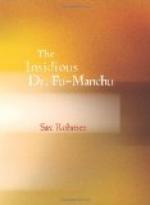At intervals of some five to ten minutes, his blackened briar (which I never knew him to clean or scrape) would go out. I think Smith used more matches than any other smoker I have ever met, and he invariably carried three boxes in various pockets of his garments.
The tobacco habit is infectious, and, seating myself in an arm-chair, I lighted a cigarette. For this dreary vigil I had come prepared with a bunch of rough notes, a writing-block, and a fountain pen. I settled down to work upon my record of the Fu-Manchu case.
Silence fell upon Maple Cottage. Save for the shuddering sigh which whispered through the over-hanging cedars and Smith’s eternal match-striking, nothing was there to disturb me in my task. Yet I could make little progress. Between my mind and the chapter upon which I was at work a certain sentence persistently intruded itself. It was as though an unseen hand held the written page closely before my eyes. This was the sentence:
“Imagine a person, tall, lean, and feline, high-shouldered, with a brow like Shakespeare and a face like Satan, a close-shaven skull, and long, magnetic eyes of the true cat-green: invest him with all the cruel cunning of an entire Eastern race, accumulated in one giant intellect. . .”
Dr. Fu-Manchu! Fu-Manchu as Smith had described him to me on that night which now seemed so remotely distant—the night upon which I had learned of the existence of the wonderful and evil being born of that secret quickening which stirred in the womb of the yellow races.
As Smith, for the ninth or tenth time, knocked out his pipe on a bar of the grate, the cuckoo clock in the kitchen proclaimed the hour.
“Two,” said James Weymouth.
I abandoned my task, replacing notes and writing-block in the bag that I had with me. Weymouth adjusted the lamp which had begun to smoke.
I tiptoed to the stairs and, stepping softly, ascended to the sick room. All was quiet, and Mrs. Weymouth whispered to me that the patient still slept soundly. I returned to find Nayland Smith pacing about the room in that state of suppressed excitement habitual with him in the approach of any crisis. At a quarter past two the breeze dropped entirely, and such a stillness reigned all about us as I could not have supposed possible so near to the ever-throbbing heart of the great metropolis. Plainly I could hear Weymouth’s heavy breathing. He sat at the window and looked out into the black shadows under the cedars. Smith ceased his pacing and stood again on the rug very still. He was listening! I doubt not we were all listening.
Some faint sound broke the impressive stillness, coming from the direction of the village street. It was a vague, indefinite disturbance, brief, and upon it ensued a silence more marked than ever. Some minutes before, Smith had extinguished the lamp. In the darkness I heard his teeth snap sharply together.




